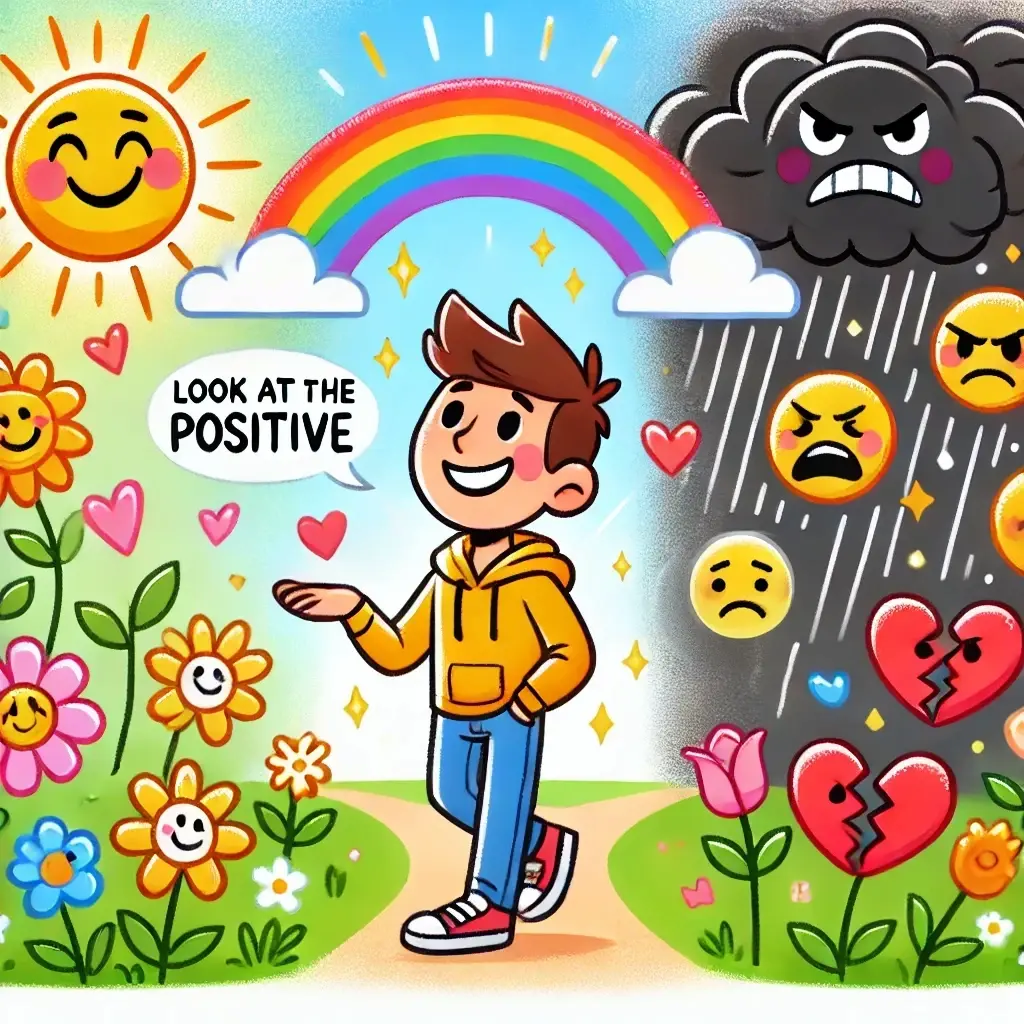In our fast-paced modern world, where stress levels are at an all-time high and mental health challenges continue to rise, finding ways to cleanse both our minds and bodies has never been more essential. While we often focus on physical detoxification through diet and exercise, we sometimes overlook the equally important practice of mental detoxification. This blog explores powerful insights inspired by Swami Mukundananda's teachings on how to purify both aspects of our being.
The Pollution of Negative Thoughts

Have you ever noticed how one negative thought about someone can spiral into a whole narrative in your mind? Before you know it, you're harboring resentment, replaying past hurts, and creating elaborate stories about why that person is "bad." According to spiritual wisdom, these thoughts don't just affect our relationships—they fundamentally alter our own consciousness.
As Swamiji explains, "It is by our thoughts that we purify ourselves. It is by our thoughts that we pollute ourselves."
This concept illustrates the powerful story of the sage and the swans. A sage who meditated by a crystal-clear mountain lake attracted beautiful swans that would gather around him, drawn by his peaceful vibrations. When a hunter convinced the sage to help capture these swans, something fascinating happened. The next day, when the sage sat to meditate with the net hidden beneath him, intending to capture the swans, not a single swan appeared.
The animals sensed the change in his energy. His thoughts had shifted from peace to capturing them, and they intuitively detected this shift. This story beautifully illustrates how our thoughts create energy that others can sense—even animals with their heightened intuition.
The Hidden Cost of Fault-Finding
One of the most toxic mental habits we develop is fault-finding. How often do we focus on what's wrong with others rather than looking at our own shortcomings? It is far easier to judge others than to turn that critical eye inward.
Swamiji shares an insightful story of two brothers who, inspired after attending a spiritual program, committed to waking up at 4 AM to meditate. The next morning, the elder brother woke up on time while the younger one continued sleeping. Instead of focusing on his meditation, the elder brother became annoyed, thinking, "What a rascal he is. I am awake here meditating and he is just sleeping."
Their father wisely observed, "If you had to find faults with your brother, you shouldn't have woken up at 4 AM. You were better off sleeping."
This story hits close to home for many of us. How often do we engage in spiritual practices, attend wellness retreats, or pursue personal development, only to use our "enlightenment" to judge others more harshly? The purpose of spiritual growth isn't to become a better critic—it is to become a better human.
The Mental Health Impact of Harboring Ill Will
From a psychological perspective, harboring negative thoughts about others creates what therapists call "cognitive distortions." These distorted thinking patterns shape how we perceive reality and can significantly impact our mental health.
When we constantly focus on others' faults, several harmful processes occur:
1. Pride increases - We position ourselves as superior judges
2. Self-awareness decreases - We ignore our own shortcomings
3. Negative filtering - We train our minds to see the negative in everything
4. Relationship damage - We create distance between ourselves and others
The spiritual wisdom shared by Swamiji aligns perfectly with modern psychological research—harboring ill will toward others primarily harms ourselves. As he puts it, "When we keep resentful thoughts towards others... the loss that is suffered is by us, not by the other."
Mental Reframing: The Art of Positive Interpretation

One of the most powerful techniques for mental detoxification is reframing—the ability to interpret situations in a way that preserves inner peace. This isn't about denying reality or bypassing legitimate concerns; it's about choosing interpretations that serve our wellbeing and spiritual growth.
Consider the story of Venkatnath, a devotee who experienced what we might call bullying today. Some youths hung a garland of shoes and slippers at his gate entrance, intending to mock him when he walked into it. When it fell on him, instead of feeling humiliated or angry, Venkatnath remarkably reframed the situation, saying: "Some people take the shelter of karma for elevation. Some take the shelter of knowledge. But I will take the shelter of the shoes of these devotees of the Lord."
Similarly, the Sufi saint Usman, when someone threw ashes on him from a second-floor window, looked up and said, "Oh Lord, you are so compassionate. I was worthy of this that you should have thrown burning ember upon me. And all you did was to throw ashes."
These examples might seem extreme, but they demonstrate the extraordinary power of mental reframing to maintain inner peace regardless of external circumstances.
Your Perception Creates Your Reality
Have you ever noticed how some people can find joy in almost any situation while others find problems everywhere they go? This difference in perception fundamentally shapes our experience of reality.
As illustrated in the story of the room with a thousand mirrors, when a little girl said "I love you," all the reflections showed loving expressions in return. When a boy raised his hand threateningly, all the reflections appeared threatening. The mirrors didn't change—the perception did.
Similarly, the story of the old man outside the village reveals this truth. When travelers asked about the people in the village, he first inquired about the people where they came from. If travelers described their hometown folks as "bad," he would say, "The people here are also very bad." If they described their hometown folks as "nice," he would say, "You will find these people also so nice."
This wisdom resonates with modern cognitive psychology, which recognizes that our thoughts and perceptions shape our experience more than objective reality. As the saying goes, "We don't see things as they are; we see them as we are."
Practical Steps for Mind-Body Detoxification

1. Practice Thought Awareness
Begin noticing your thoughts, especially judgments about others. Simply becoming aware of how often you engage in fault-finding can be transformative. Try setting a "judgment bell" on your phone that reminds you several times a day to check in with your thoughts.
2. Implement a "No Gossip" Challenge
Commit to a week without speaking negatively about anyone. This practice forces us to redirect our attention away from others' faults and cultivates positive speech patterns.
3. Develop the "Good Finder" Muscle
As Swamiji suggests, "Don't be a fault finder, be a good finder." Each day, consciously look for the good in people who challenge you. Write down three positive qualities about someone you typically criticize.
4. Practice Reframing Exercises
When something "negative" happens, practice generating three alternative interpretations that preserve your peace of mind. This trains your brain to see multiple perspectives rather than defaulting to the most negative one.
5. Mirror Meditation
Spend five minutes looking into your own eyes in the mirror each morning, practicing self-compassion. As you become more gentle with yourself, you naturally extend that gentleness to others.
6. Healthy Physical Detoxification
Support mental clarity with physical practices:
• Hydrate with lemon water first thing in the morning
• Incorporate anti-inflammatory foods like turmeric and ginger
• Practice deep breathing exercises to support the body's natural detoxification
• Engage in gentle movement like walking or yoga to support lymphatic flow
The Spiritual Dimension of Detoxification
True detoxification isn't just about feeling better—it's about evolving as a human being. When we purify our thoughts and intentions, we create space for deeper spiritual connection and genuine compassion.
As we release judgment, we discover that everyone is fighting their own battles. We begin to see the divine spark in each person, regardless of their actions or behaviors. This perspective doesn't mean we allow harmful behavior—it means we respond from wisdom rather than reactivity.
A One-Day Detox Challenge

Morning:
• Begin with five minutes of gratitude meditation
• Drink warm lemon water to support physical detoxification
• Set an intention: "Today I will see the good in others"
Throughout the day:
• Pause before judging anyone, internally or externally
• Practice reframing any challenging situations
• Stay hydrated and eat nourishing, whole foods
Evening:
• Reflect on moments when you successfully avoided judgment
• Practice forgiveness meditation for anyone who challenged you
• Write down three personal "faults" you noticed in yourself with compassion
The beauty of this practice is that it costs nothing and requires no special equipment—just awareness and intention.
The Ripple Effect of Mental Purity
When we commit to mental detoxification, the benefits extend far beyond our own wellbeing. Our relationships improve, our communities become more harmonious, and we contribute to a more compassionate world.
Imagine if everyone practiced just one day of refraining from negative judgment. The collective shift in energy would be palpable. This is the power of individual transformation—it creates ripples that extend outward in ways we cannot measure.
Conclusion: The Daily Choice
Each day presents countless opportunities to pollute or purify our minds. The news, social media, workplace dynamics, and family interactions all test our commitment to mental purity.
The wisdom shared by Swamiji reminds us that spiritual progress isn't measured by external achievements but by our ability to maintain inner peace and goodwill toward all. As he says, "If you wish to progress in sadhana (spiritual practice), then don't create ill will, even in your dreams, even by mistake."
This teaching invites us to make a revolutionary choice—to take responsibility for our thoughts, knowing they shape not only our perception but our very being. When we purify our thoughts, we purify ourselves, and in doing so, we contribute to the healing of our collective consciousness.
The journey of detoxification is lifelong, but it begins with a single day, a single choice, a single thought. Will you accept the challenge?
Resources
2 TIPS to DETOX Your MIND and BODY | Try It For Just 1 Day - Swami Mukundananda
Mukundananda, S. (2020). The Science of Mind Management, Westland Publications: Chennai, India.


